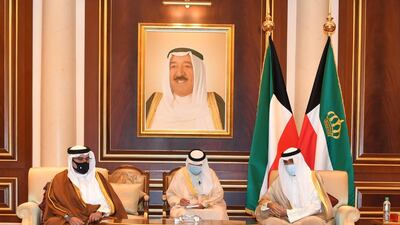Kuwait's new ruler Emir Sheikh Nawaf Al Sabah on Wednesday named Sheikh Meshal Al Ahmad Al Sabah as crown prince, state-run Kuna news agency reported.
Sheikh Meshal is currently the deputy chief of the National Guard and a brother of the late emir, who died last Tuesday.
The selection of Sheikh Meshal, which must be approved by parliament, "was blessed by the Al Sabah family", Kuna said, quoting a statement from the emir's office.
Earlier, two members of Kuwait's ruling family posted messages on Twitter pledging allegiance to Sheikh Meshal as crown prince.
Sheikh Nawaf assumed office following the death of his brother Sheikh Sabah Al Ahmad last week.

Although Sheikh Nawaf had a full year to choose a successor, he picked Sheikh Meshal in a record-breaking eight days, ending frenzied speculation that has gripped Kuwaiti social media.
Before Sheikh Meshal can be officially named crown prince, lawmakers must approve the choice during their final session on Thursday.
Following the session, Kuwait’s parliament will dissolve itself ahead of elections tentatively set for late November.
But breaking with tradition, Sheikh Nawaf has asked the Cabinet to continue performing its duties despite the prime minister’s offer to resign, Kuna reported.
Sheikh Nawaf “affirmed his great confidence” in the government of Prime Minister Sheikh Sabah Al Khaled and asked the same government to “continue carrying out its tasks” until the elections.
Sheikh Meshal is known as a forceful figure who steered clear of public roles, spending much of his career helping build the Gulf Arab state's security and defence apparatus.
Close to the late emir Sheikh Sabah and new ruler Sheikh Nawaf, Kuwait experts say, he is expected to take an active role in helping guide state affairs.
"The emir will listen to his views, he will have an impact in that way," Kuwaiti political scientist and former UN envoy Ghanim Alnajjar told Reuters. "His focus will be security, the judiciary and other domestic issues."
Sheikh Meshal, 80, has been deputy chief of the National Guard since 2004 and was head of State Security for 13 years after joining the Interior Ministry in the 1960s. He had been offered several senior positions in the past but declined them, experts say.
Sheikh Meshal, an alumnus of Britain's Hendon Police College, was credited with helping to reform Kuwait's National Guard, and Kuwaiti journalist Faisal Al Qanae once described him as the "biggest enemy" of cronyism and lawbreaking.
Sheikh Meshal's appointment traditionally works as a conduit between the ruling family and the national assembly, which will face elections later this year.
Bader Al Saif, an assistant professor of history at Kuwait University, said: "He's an insider and an outsider at the same time."
He said the National Guard was a respected institution above the political fray.
Sheikh Meshal is no newcomer to Kuwaiti government. He was a close confidant of Sheikh Sabah throughout his tenure, accompanying him on official diplomatic visits as well as to the Mayo Clinic in Rochester, Minnesota, where the emir received medical treatment after surgery and later died last week.
The roles of the heir apparent and prime minister were split in 2003 due to the health of the then crown prince. The premier has since dealt with frequent gridlock between the hand-picked Cabinet and the parliament, which has recently been at odds with ministers over debts, investment and economic reforms.
Observers say that while both Sheikh Nawaf and Sheikh Meshal kept a low public profile, the latter has stronger views.
Sheikh Nawaf, who is seen upholding Kuwait's current oil, investment and foreign policies, takes the helm as the country faces a liquidity crisis caused by low oil prices and the coronavirus pandemic, which the National Guard has played a visible role in combating.
Diplomats and analysts say the immediate focus will be on domestic issues with living standards and the economy the top priorities for most Kuwaitis in a country.
Deutsche Bank has estimated that Kuwait's nearly $140 billion economy could shrink by 7.8 per cent this year in what would be one of the worst economic crunches among Gulf oil exporters.
Key will be co-operation between Cabinet and the parliament, the Gulf region's oldest legislature that wields power to block bills and question ministers. Disagreements have led to successive government reshuffles or dissolution of parliament.






















